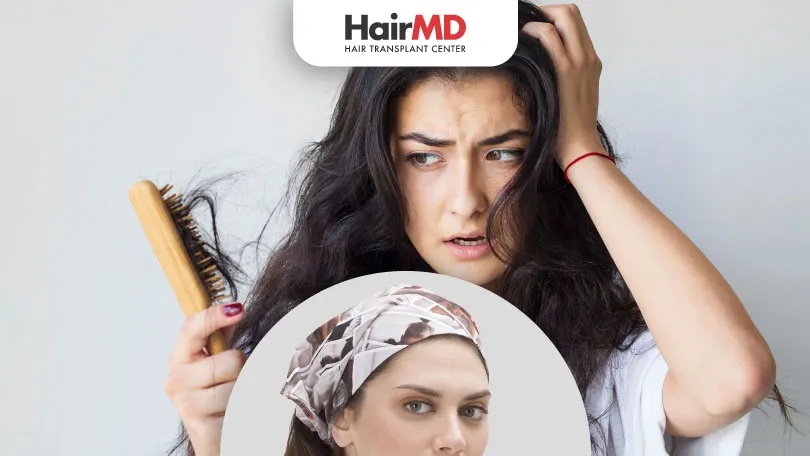30th September, 2021

If your hair has started to look different and lacks volume, it’s time to think if you are doing anything wrong with your hair. Sometimes the daily hair care routine can cause hair damage, and it can include the way you tie your hair regularly or wearing a scarf, bandanas, or hat to protect yourself from the sun. Facts about headgear like bandanas and scarves causing hair loss are very few, yet there is a conception that it may cause a receding hairline.
Our hair goes through a cycle of growth, rest and fall to allow new hair to grow. The fall phase is also called the shedding phase, and on average, a healthy individual sheds about 50-100 strands that are considered normal by hair doctors. If someone is shedding more than that and the area is getting bald, it’s a matter of concern.
What’s covered in the article?
- Do Bandanas cause Hair Loss?
- Can you manage Bandanas and Hair Loss Problems?
- Conclusion
Do Bandanas cause Hair Loss?
Bandanas are like scarfs tied on the head with knotting at the back of the head. Bikers mostly wear these to secure their head under the helmet. Girls also wear this unisex headband to hide a bad hair day or as a fashion accessory. But repeatedly wearing a bandana can make your hair break around the hairline. Wearing a tight headband daily adds stress on the scalp and hair follicles which can gradually lead to traction alopecia.
The fabric of your bandana is not the reason for the traction but the hairdo that is being done under the bandana is. Generally, hair is pulled back tightly to secure it under the bandana, and this stress can cause weakening of the hair follicles and leads to hair loss, thinning, and speeds the process of balding by reducing the anagen growth cycle.
Can you manage Bandanas and Hair Loss Problems?
Traction alopecia, if caught early, can be reversed through hair treatments. To avoid the stress on the hair under the bandanas, try setting them loosely and use your bandana to secure your hair instead of a bobby pin, which pulls the hair and adds pressure to the scalp and hair follicles. Give hair breather days by not covering them with any hair tie.
Get a hair loss evaluation at HairMD to determine the stage of alopecia or any other hair problem you face. The hair doctors can help you reverse your traction alopecia via various treatment options.
Do You Know?
Nearly 250 Patients Visit HairMD
Everyday For Various Hair Concerns?
(You are one click away from flawless skin)
Meet Our Dermatologists
Conclusion
In conclusion, while bandanas themselves don’t directly cause hair loss, wearing them tightly can lead to traction alopecia due to the stress placed on hair follicles. To prevent this, it’s important to wear bandanas loosely and avoid pulling your hair too tightly. Early detection of traction alopecia can help reverse its effects with proper treatment. Consulting a dermatologist will provide the best solutions for managing hair loss and maintaining healthy hair.
Further Reading
Topical Finasteride – A Revolutionary Approach to Hair Loss Treatment
Learn how topical finasteride combats hair loss by reducing DHT levels locally with fewer side effects. Visit HairMD Clinic Pune for expert solutions.
Hair Loss – Could It Be a Sign of a Bigger Health Problem?
Find effective hair regrowth treatments for women. Explore solutions like PRP, medications, and more to combat hair loss with expert advice from HairMD.
Do Hats or Helmets Cause Hair Loss?
Discover the truth about Helmets Cause Hair Loss. Learn how improper helmet use & effective tips to maintain healthy hair with HairMD can affect hair health.
Top Hair Growth Treatments for Women: Your Ultimate Guide
Find effective hair regrowth treatments for women. Explore solutions like PRP, medications, and more to combat hair loss with expert advice from HairMD.
Have thoughts? Please let us know
We are committed not only to treating you, but also educating you.











